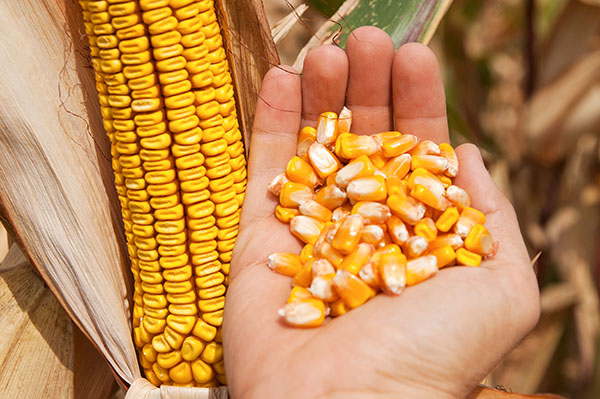We all know that greenhouse gas (GHG) emissions must decrease rapidly to limit global warming and prevent catastrophic climate change. The transportation sector is a big contributor to GHG emissions (approximately 30% of the US total emissions) and biofuels can play a significant role in reducing these emissions.
Read MoreThe University of Kentucky, Martin-Gatton College of Agriculture, Food, and Environment, is working to uncover the mysterious world of gene silencing in plants. Thanks to this research, scientists may develop more effective ways to improve crop yields, increase resistance to pests and diseases, and reduce agriculture’s environmental impact.
Read More“Farming is an inherently stressful occupation, and well-being includes mental and physical aspects,” Commissioner Quarles said. “The Raising Hope Kentucky initiative continues to provide farmers with information about mental health resources and destigmatize mental health issues. The awards given out help continue that progress toward mental health awareness for our farming community.”
Read MoreA task force has been charged with finding solutions to Kentucky’s large-animal veterinarian shortage.
Read MoreErosion can be a very gradual process. Naturally, erosion occurs everywhere. Energy in rain drops or wind detaches particles at the soil surface, then moves these mineral and carbon particles downslope or down-wind to another location. In the Great Plains and further west, this energy is most often provided by the wind. But in the east, including Kentucky, the energy is provided in the form of raindrops.
Read MoreThe sun-dappled rolling fields of Kentucky host a unique set of challenges as summer approaches. Kentucky farmers must remain vigilant with rising temperatures, longer daylight hours, and changing patterns of pests and diseases.
Read MoreFor decades, environmental experts, government agencies, and concerned citizen groups have been hearing about and monitoring an area in the Gulf of Mexico that has come to be known as the Hypoxia Zone.
Read MoreHow do genetically modified crops affect the environment? TeachKyAg went to GMOanswers.com, a resource widely supported by its partners, to answer this question.
Read MoreIn 2014, the Kentucky General Assembly passed HB 448- an act relating to destruction of crops on farms by wildlife. This bill allowed landowners to kill or trap on their lands any wildlife causing damage to the lands or personal property without a tag.
Read MoreThe latest information from the USDA National Agricultural Statistics Service, Kentucky Field Office notes, “Pasture conditions continue to decline as drought and cool temperatures are stunting regrowth. Grazing has been limited as the grass is brown and dormant. Many farmers have been feeding hay for a month at this point and concern is growing for winter hay stocks.”
Read MoreFor farm families across the country, the issue of adequate labor is an ever-increasing problem. Finding domestic help seems to be a thing of the past in many areas, and navigating a complex and expensive federal system to bring workers in from other countries is, well, complex and expensive.
Read MoreU.S. Senate Republican Leader Mitch McConnell paid a visit to Graves County recently to discuss the distribution of $20 million of USDA funding to build temporary grain storage facilities in areas affected by last year’s tornadoes. West Kentucky grain producers were especially affected facing uncertainty about storage for their 2022 crops.
Read MoreEvery year, people contract diseases from insects and ticks. These diseases can be life altering, and in some cases, life threatening and life ending. Entomologists in the University of Kentucky College of Agriculture, Food and Environment are working hard to develop innovative ways to control troublesome insects that prey on humans. By Katie Pratt.
Read MoreSpring is in the air, but the improving weather also means a rise in invasive plants species. Invasive plants can have major biological, economical and aesthetic impacts on Kentucky. By Jordan Strickler
Read MoreUniversity of Kentucky soil scientists are leading a project with researchers at the Salk Institute for Biological Studies to find ways to create more vibrant and robust plant root systems. By Katie Pratt
Read MoreTo gain some insight into the difference between pesticide-free and organic, Best Food Facts reached out to Dr. Paul Vincelli, Extension Professor and Provost’s Distinguished Service Professor, University of Kentucky.
Read MoreEarlier this month, a subcommittee of the U.S. House of Representatives Committee on Oversight and Reform released a staff report that confirmed several baby food companies had knowingly used food ingredients that contained “high” levels of toxic heavy metals in their products.
Read MoreMention GMOs – genetically modified organisms – and you’ll likely hear a wide range of opinions. Some believe these plants and animals have great benefits to produce food and protect the environment. Others believe they hold potential risks and should be avoided. GMOs have been in use for many years. Despite the broad scientific consensus that they are safe to eat and safe for the environment, their use has generated plenty of public dialogue, questions and curiosity about the technology.
Read MoreAgricultural economists from the University of Kentucky College of Agriculture, Food and Environment are projecting 2020 farm cash receipts to be $5.5 billion, equaling 2019 receipts. The economists estimate that net farm income will likely exceed the $2.2 billion Kentucky producers earned in 2019.
Read MoreThe Food and Drug Administration (FDA) recently released a report summarizing the sales of medically important antibiotics for agricultural use in 2018. There was a 21 percent decrease in sales from 2009, the first year of reported sales. The decline is even more significant when compared with 2015 – a 38 percent decrease according to the FDA report.
Read More



















